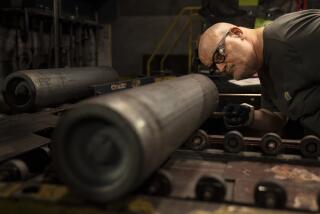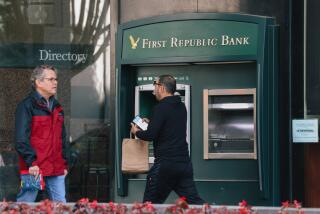Bush Admits U.S. Is in Slump; He Blames Iraq : Economy: The President says the gravity of the slowdown will depend on oil prices. He gives no hint of any steps he plans to head off a recession.
WASHINGTON â President Bush conceded Thursday that the nation is in âan economic slowdown,â and said the slumpâs depth and length will depend on the behavior of oil prices in the face of continuing turmoil in the Persian Gulf.
âIâm not an economist, but most seem to feel that if we have a recession . . . that it will not be deep and that weâll come out of it relatively soon--six months at most,â Bush said in a late-afternoon interview on Cable News Network.
âThe oil question that comes from Saddam Husseinâs taking over of Kuwait is a big question mark here,â he added. âThat is the major question mark in terms of the depth of the slowdown or recession.â
Although Bush declined to join many private economists in calling the slowdown a full-fledged recession, his remarks Thursday were the most bearish he has made about the state of the economy.
They also marked the Presidentâs return to the argument that tough U.S. action in the Persian Gulf is needed to preserve the Westâs economic security--an argument he made when he first deployed U.S. troops to the Persian Gulf but later downplayed.
âYou have all kinds of ingredients (in the Persian Gulf situation), and jobs, Iâd say, comes under the heading of the economic security of the world,â the President said Thursday. âAnd itâs a very important part of this.â
His remarks came as Bush summoned top business leaders to the White House to seek their views on how to bolster the economy. At the session, the President did not hint at any new steps to help head off a recession.
Although many economists have warned that the sharp rise in oil prices has contributed to the slowdown here, not all of them have agreed that the slump comes entirely as a result of high energy prices. Some also say Bushâs own economic policies are to blame.
Bush conceded Thursday that âsome regionsâ of the country are depressed enough to be technically in a recession. But he noted that other areas are âdoing quite well,â and he refused to say the economy is in a recession.
But the President was adamant in blaming the slump on public âfearâ resulting from the sharp increase in oil prices that has followed Iraqâs Aug. 2 invasion of Kuwait.
âThereâs a slowdown, an economic slowdown,â Bush said in the CNN interview, âand itâs a disproportionate increase in the price of oil that stems from what (Iraqi President) Saddam Hussein has done. Itâs the fear because of what heâs done, and it does mean jobs.â
Thursdayâs White House session with business leaders, one of a series Bush has said he plans in the face of a worsening economic picture, was closed to reporters. Wary White House officials ordered participants not to discuss what went on.
But business leaders who attended said the President listened to generally downbeat reports from the executives, particularly involving the real estate and construction industries.
The 1 1/2-hour session with 10 leaders from manufacturing, banking and service-related industries followed a similar Wednesday meeting with banking regulators, in which the White House refueled the long rift between the Administration and the Federal Reserve Board.
At that session, officials confirmed Thursday, Commerce Secretary Robert A. Mosbacher criticized the Fed for sparking a credit crunch.
âI think there was probably a view (among business leaders) that we may have slipped into a recession,â John G. Medlin Jr., president of First Wachovia Corp., a leading North Carolina-based bank holding company, told reporters afterward. âThere was not much argument that we were somewhere in that area between a little growth and a little decline.â
There was no evidence, however, that either Bush or other Administration officials tried to lobby Federal Reserve Chairman Alan Greenspan to get the Fed to quickly lower interest rates.
Indeed, the President appeared to be endorsing the tightening in bank lending policies, telling CNN interviewers: âWell, sometimes you have to pay for excesses, and we had a kind of go-go lending policies in some of our financial institutions.â
Bush said one business leader in Thursdayâs conference had told him: âIt doesnât hurt to shake things out.â
âWe got into a lending psychology in some parts of the private sector that thereâs no tomorrow, and loans were made then that wouldnât be made now,â Bush declared.
Bush had been quiet about the economic situation until last Friday, when he conceded in remarks to reporters that he was âconcerned about an economic slowdown in the economyâ and launched a review of the economic situation by top policy makers.
More to Read
Get the L.A. Times Politics newsletter
Deeply reported insights into legislation, politics and policy from Sacramento, Washington and beyond. In your inbox three times per week.
You may occasionally receive promotional content from the Los Angeles Times.










